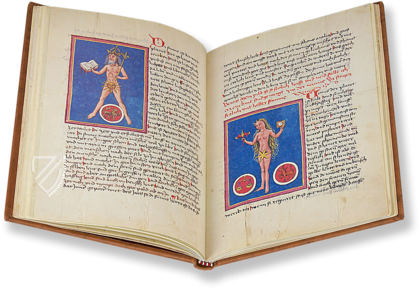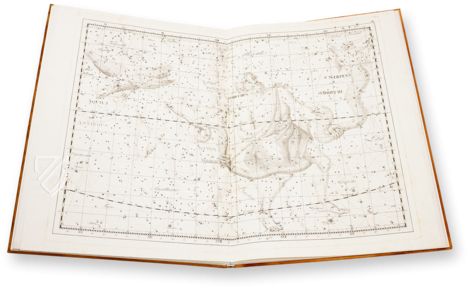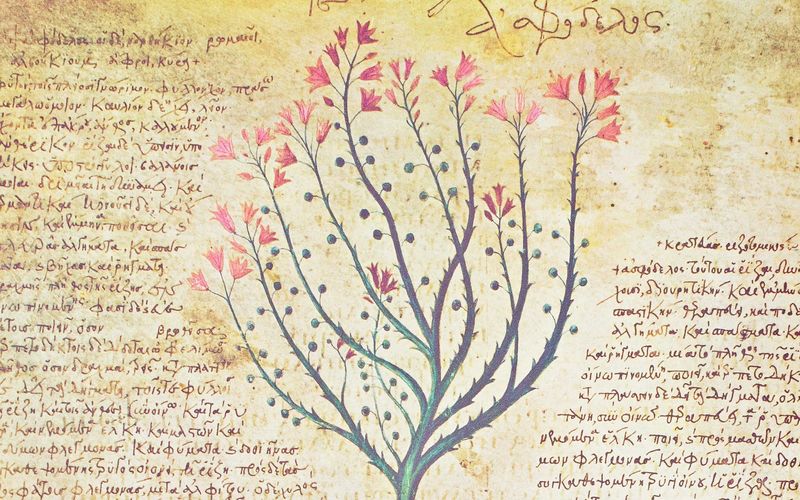Astromagia of Alfonso X of Castile
(1,000€ - 3,000€)
King Alfonso the Wise was one of the most learned rulers of the Middle Ages and cultivated a tolerant and cosmopolitan culture during his reign in the 13th century. His scribes created a mountain of manuscripts from the Arabic texts that his mostly Jewish scholars translated into Latin and Castilian. This specimen of Spanish illumination is one of the few to survive to the present, and is a testimonial to the King’s great fascination with the stars.
Astromagia of Alfonso X of Castile
King Alfonso X of Castile, León, and Galicia (1221–84) is commonly known as “Alfonso the Wise”, but he also has a second epithet: el Astrólogo – “the Astrologer”. He was a famous patron of the arts and sciences, with particular interest in astronomy and astrology, supporting such projects as the Alfonsine Tables, which is named after the King, as is the Moon’s Alphonsus Crater. Alfonso ruled over a rich and diverse kingdom from his de facto capital in Toledo and took advantage of this by surrounding himself with mostly Jewish (and some Arab) intellectuals capable of translating Arab texts into Castilian. This hybrid Christian-Jewish-Arab culture lead directly to the establishment of the Toledo School of Translators, which had the specific purpose of translating Arabic works on every subject imaginable, first into Latin but later into Castilian under the direction of Alfonso X.
A Rare Specimen
This manuscript is part of a group of texts on the stars that were created between 1276 and 1279. Unfortunately, precious few of these manuscripts have survived, but this rare specimen has been lovingly preserved. It attests to the advanced state of Arabian astronomy ca. 1000, which was based on the Theory of Phases by Ptolemy (ca. 100 – ca. 170) and other Alexandrians, as well as contributions from Babylonian, Indian, and Sassanid sources. It is an essential source for understanding the general theory of the zodiac and an incomparable source for historical researchers due to the diversity of its sources. The cosmological, medical, intellectual, and religious basis of ancient cultures is thus elucidated.
Codicology
- Alternative Titles
- Astrologie und Magie von Alfons X. der Weise
Tratado de astrología y magia
Tratado de astrología y magia de Alfonso X el sabio
Book of Astral Magic of Alfonso X
Libro de astromagia - Date
- Second half of the 13th century
- Epochs
- Style
- Genre
#1 Tratado de astrología y magia
Language: Spanish
(1,000€ - 3,000€)
- Treatises / Secular Books
- Apocalypses / Beatus
- Astronomy / Astrology
- Bestiaries
- Bibles / Gospels
- Chronicles / History / Law
- Geography / Maps
- Saints' Lives
- Islam / Oriental
- Judaism / Hebrew
- Single Leaf Collections
- Leonardo da Vinci
- Literature / Poetry
- Liturgical Manuscripts
- Medicine / Botany / Alchemy
- Music
- Mythology / Prophecies
- Psalters
- Other Religious Books
- Games / Hunting
- Private Devotion Books
- Other Genres
- Afghanistan
- Armenia
- Austria
- Belgium
- Colombia
- Croatia
- Czech Republic
- Denmark
- Egypt
- Ethiopia
- France
- Germany
- Hungary
- India
- Iran
- Iraq
- Israel
- Italy
- Japan
- Luxembourg
- Mexico
- Morocco
- Netherlands
- Peru
- Poland
- Portugal
- Russia
- Serbia
- Spain
- Sri Lanka
- Sweden
- Switzerland
- Syria
- Turkey
- Ukraine
- United Kingdom
- United States
- Uzbekistan
- Aboca Museum
- Ajuntament de Valencia
- Akademie Verlag
- Akademische Druck- u. Verlagsanstalt (ADEVA)
- Aldo Ausilio Editore - Bottega d’Erasmo
- Alecto Historical Editions
- Alkuin Verlag
- Almqvist & Wiksell
- Amilcare Pizzi
- Andreas & Andreas Verlagsbuchhandlung
- Archa 90
- Archiv Verlag
- Archivi Edizioni
- Arnold Verlag
- ARS
- Ars Magna
- ArtCodex
- AyN Ediciones
- Azimuth Editions
- Badenia Verlag
- Bärenreiter-Verlag
- Belser Verlag
- Belser Verlag / WK Wertkontor
- Benziger Verlag
- Bernardinum Wydawnictwo
- BiblioGemma
- Biblioteca Apostolica Vaticana (Vaticanstadt, Vaticanstadt)
- Bibliotheca Palatina Faksimile Verlag
- Bibliotheca Rara
- Boydell & Brewer
- Bramante Edizioni
- Brepols Publishers
- British Library
- C. Weckesser
- Caixa Catalunya
- Canesi
- CAPSA, Ars Scriptoria
- Caratzas Brothers, Publishers
- Carus Verlag
- Circulo Cientifico
- Club Bibliófilo Versol
- Club du Livre
- CM Editores
- Collegium Graphicum
- Collezione Apocrifa Da Vinci
- Comissão Nacional para as Comemorações dos Descobrimentos Portugueses
- Coron Verlag
- Corvina
- CTHS
- D. S. Brewer
- De Agostini/UTET
- De Schutter
- Deuschle & Stemmle
- Deutscher Verlag für Kunstwissenschaft
- DIAMM
- Droz
- E. Schreiber Graphische Kunstanstalten
- Ediciones Boreal
- Ediciones Grial
- Ediclube
- Edições Inapa
- Edilan
- Editalia
- Edition Georg Popp
- Edition Leipzig
- Edition Libri Illustri
- Editiones Reales Sitios S. L.
- Éditions de l'Oiseau Lyre
- Editions Medicina Rara
- Editorial Casariego
- Editorial Mintzoa
- Editrice Antenore
- Editrice Velar
- Edizioni Edison
- Egeria, S.L.
- Eikon Editores
- Electa
- Enciclopèdia Catalana
- Eos-Verlag
- Ephesus Publishing
- Eugrammia Press
- Extraordinary Editions
- Fackelverlag
- Facsimila Art & Edition
- Facsimile Editions Ltd.
- Facsimilia Art & Edition Ebert KG
- Faksimile Verlag
- Feuermann Verlag
- Folger Shakespeare Library
- Franco Cosimo Panini Editore
- Friedrich Wittig Verlag
- Fundación Hullera Vasco-Leonesa
- G. Braziller
- Gabriele Mazzotta Editore
- Gebr. Mann Verlag
- Gesellschaft für graphische Industrie
- Getty Research Institute
- Giovanni Domenico de Rossi
- Giunti Editore
- Graffiti
- Grafica European Center of Fine Arts
- Guido Pressler
- Guillermo Blazquez
- H. N. Abrams
- Harrassowitz
- Helikon
- Hendrickson Publishers
- Henning Oppermann
- Herder Verlag
- Hes & De Graaf Publishers
- Hoepli
- Hortus Deliciarum
- Houghton Library
- Hugo Schmidt Verlag
- Idion Verlag
- Il Bulino, edizioni d'arte
- ILte
- Imago
- Insel Verlag
- Instituto de Estudios Altoaragoneses
- Instituto Nacional de Antropología e Historia
- Istituto dell'Enciclopedia Italiana - Treccani
- Istituto Ellenico di Studi Bizantini e Postbizantini
- Istituto Geografico De Agostini
- Istituto Poligrafico e Zecca dello Stato
- Italarte Art Establishments
- J. Thorbecke
- Jan Thorbecke Verlag
- Johnson Reprint Corporation
- Jugoslavija
- Karl W. Hiersemann
- Kasper Straube
- Kaydeda Ediciones
- Konrad Kölbl Verlag
- Kurt Wolff Verlag
- La Liberia dello Stato
- La Linea Editrice
- La Meta Editore
- Lambert Schneider
- Landeskreditbank Baden-Württemberg
- Leo S. Olschki
- Les Incunables
- Library of Congress
- Libreria Musicale Italiana
- Lichtdruck
- Lito Immagine Editore
- Lumen Artis
- Lund Humphries
- M. Moleiro Editor
- Maison des Sciences de l'homme et de la société de Poitiers
- Manuscriptum
- Maruzen-Yushodo Co. Ltd.
- MASA
- McGraw-Hill
- Militos
- Millennium Liber
- Müller & Schindler
- National Library of Wales
- Neri Pozza
- Nova Charta
- Oceanum Verlag
- Odeon
- Orbis Mediaevalis
- Orbis Pictus
- Österreichische Staatsdruckerei
- Oxford University Press
- Pageant Books
- Parzellers Buchverlag
- Patrimonio Ediciones
- Pattloch Verlag
- PIAF
- Pieper Verlag
- Plon-Nourrit et cie
- Prestel Verlag
- Princeton University Press
- Prisma Verlag
- Priuli & Verlucca, editori
- Pro Sport Verlag
- Propyläen Verlag
- Pytheas Books
- Quaternio Verlag Luzern
- Reales Sitios
- Recht-Verlag
- Reichert Verlag
- Reichsdruckerei
- Riehn & Reusch
- Roberto Vattori Editore
- Rosenkilde and Bagger
- Roxburghe Club
- Salerno Editrice
- Sarajevo Svjetlost
- Schöck ArtPrint Kft.
- Scolar Press
- Scrinium
- Scripta Maneant
- Scriptorium
- Siloé, arte y bibliofilia
- SISMEL - Edizioni del Galluzzo
- Sociedad Mexicana de Antropología
- Sorli Ediciones
- Stainer and Bell
- Styria Verlag
- Sumptibus Pragopress
- Szegedi Tudomànyegyetem
- Taberna Libraria
- Tarshish Books
- Taschen
- Tempus Libri
- Testimonio Compañía Editorial
- Thames and Hudson
- The Clear Vue Publishing Partnership Limited
- The Facsimile Codex
- The Folio Society
- The Marquess of Normanby
- The Richard III and Yorkist History Trust
- Tip.Le.Co
- TouchArt
- TREC Publishing House
- TRI Publishing Co.
- Trident Editore
- Typis Regiae Officinae Polygraphicae
- Universidad de Granada
- University of California Press
- University of Chicago Press
- Urs Graf
- Vallecchi
- Van Wijnen
- VCH, Acta Humaniora
- VDI Verlag
- Verlag für Regionalgeschichte
- Verlag Styria
- Vicent Garcia Editores
- W. Turnowsky
- Wiener Mechitharisten-Congregation (Wien, Österreich)
- Wissenschaftliche Buchgesellschaft
- Xuntanza Editorial
- Zollikofer AG





